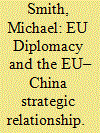| Srl | Item |
| 1 |
ID:
145775


|
|
|
|
|
| Summary/Abstract |
This article focuses on the development of the EU’s strategic relationship with China, by exploring the balance amongst three key mechanisms mobilized by the EU: framing, negotiation and management. The article outlines these issues in general, relating them to relevant conceptual and theoretical concerns, and then applies them to the EU–China strategic relationship. Through an examination of the framing ideas embodied in key documents, the development of an EU–China “negotiated order”, and the management of cooperation and competition in sectoral and institutional contexts, the article identifies a number of key tensions and requirements for effective coordination, which affect the potential development of an effective EU strategy.
|
|
|
|
|
|
|
|
|
|
|
|
|
|
|
|
| 2 |
ID:
129681


|
|
|
|
|
| Publication |
2014.
|
| Summary/Abstract |
This analysis takes its cue from Richard Langhorne's contribution on the continuities of diplomacy and the nature of the European Union [EU] as a diplomatic actor. It traces the institutional changes following the 2009 Lisbon Treaty, looking at the rationale for and the foreign policy roles of the president of the European Council, the High Representative, and, particularly, the European External Action Service [EEAS]. The creation of the EEAS has been especially contested, largely as a product of continuing competition amongst European institutions and the member states. The outcome, however, has been a more visible European diplomatic service that increasingly provides authoritative information to member states, many of whom have limited representation of their own. Whilst that potentially strengthens the role of the High Representative in policy-making, it still leaves many member states determined to see EU diplomacy in support of rather than as a substitute for their own.
|
|
|
|
|
|
|
|
|
|
|
|
|
|
|
|
| 3 |
ID:
151392


|
|
|
|
|
| Summary/Abstract |
This article analyses the US–EU transatlantic dialogue on the Iranian nuclear dossier with a particular view to the implications for EU foreign policy on Iran. Doing so, it uses neo-Gramscian scholarship to put the EU’s “over-compliance” with Iran sanctions into perspective. Constrained by the imperatives of hegemonic coercion in the form of US financial Iran sanctions against third country entities and with the hegemonic consent of a Western US-led “historic bloc”, Europe was relegated to a subaltern below its mediatory potential. It will be shown how this finding complicates the EU’s ambition to renew relations with Iran. Drawing on semi-structured interviews with experts and delegation members from the P5+1, this article thus analyses “the normative element” in the transatlantic security dialogue on Iran at a time where the latter is undergoing a sea change in the wake of the implementation of the “Joint Comprehensive Plan of Action” of July 2015.
|
|
|
|
|
|
|
|
|
|
|
|
|
|
|
|